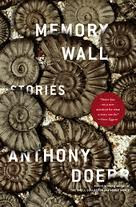After reading Anthony Doerr’s second collection, “Memory Wall,” it was easy to understand why it won the prestigious 2010 Story Prize, a prize created in 2004 to promote story collections.
 The paperback edition, released in July 2011, also includes his story, “The Deep,” which won the Sunday Times EFG Private Bank Short Story Award, a prize that offers the highest cash award given for a short story.
The paperback edition, released in July 2011, also includes his story, “The Deep,” which won the Sunday Times EFG Private Bank Short Story Award, a prize that offers the highest cash award given for a short story.
I admired all six stories in the hard cover edition, but my favorites were “Memory Wall,” “Village 113” and “Afterworld.” The title story, which won the 2010 National Magazine Award for fiction, is set in the not-too-distant future and features a wealthy South African widower beset with Alzheimer’s. Through new technology she’s able to relive memories that have been medically extracted from her brain and recorded on cartridges. As she becomes more and more reliant on the cartridges, she’s visited nightly by a mysterious man and a young helper—a memory thief—in search of one very valuable memory. Everything comes to a head and in the end, Doerr manages to infuse redemption and humanity into an otherwise bleak story.
In “Village 113” a village is about to be sacrificed for the construction of a new dam. Li Quing, a young, earnest man working for the Village Director, is put in charge of relocating everyone. His own mother, a seed keeper, is resistant. The story illustrates not only the struggle between generations, mother and son, new and old, but also the relatively new struggle between nature and technology.
“Afterworld” begins: “In a tall house in a yard of thistles eleven girls wake on the floor of eleven bedrooms.” We learn this is the house in which the protagonist Ester Gramm spent her childhood, an orphanage in Hamburg, Germany. Through the course of this beautifully rendered story, we also learn that Ester’s imperfection will ultimately save her.
So what makes Doerr’s writing special? His stories seem to have it all: imagination, suspense, metaphor, intelligence, verisimilitude and emotional depth. He uses the imagined to more aptly describe reality. But perhaps it’s his use of language which has the accuracy and vividness of poetry and his willingness to take on larger mysteries:
“Nothing lasts,” Harold would say. “For a fossil to happen is a miracle. One in fifty million. The rest of us? We disappear into the grass, into beetles, into worms. Into ribbons of light.” It‘s the rarest thing, Luvo thinks, that gets preserved, that does not get erased, broken down, transformed. –“Memory Wall”
*First published in the September 18th edition of The Pilot of Southern Pines


